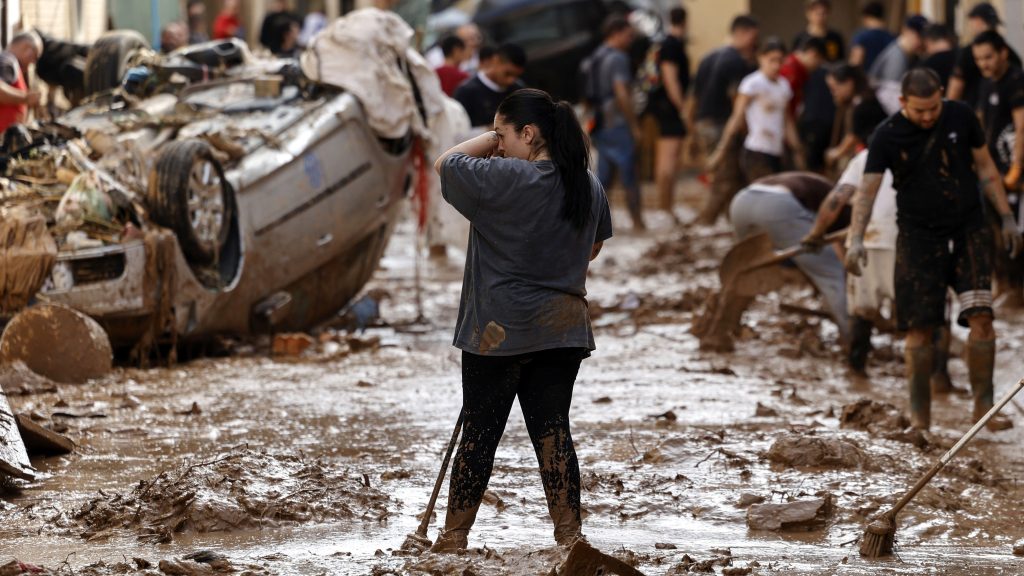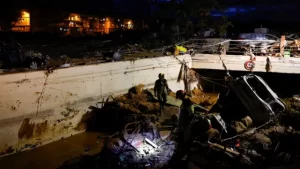Search for Spain flooding survivors continues as torrential rain hits another region
3 min read

Emergency teams in Spain are intensifying their search for dozens of individuals still unaccounted for after one of the worst flooding disasters in decades. The tragedy has claimed over 200 lives, with the majority of fatalities occurring in the Valencia region. Sadly, the death toll is expected to increase as rescue operations continue.
The floods have wreaked havoc, destroying bridges and inundating towns with mud, leaving entire communities cut off from essential services like water, food, and electricity. Many locals are expressing frustration over what they perceive as a slow response from authorities regarding flood warnings. Juan González, a resident of Aldaia in Valencia, voiced his outrage, stating, “This is an area prone to flash flooding. It’s outrageous that our local government didn’t do anything about it, knowing that this was coming.”
Another local, Augustin, shared his family’s plight, revealing that their home was completely flooded, forcing them to move in with his parents. While the worst of the weather has subsided in Valencia and along the Mediterranean coast, alerts remain in effect for southern Spain, where more heavy rain is expected through Saturday.
The Huelva region has already experienced significant downpours, with the city of Cartaya receiving nearly two months’ worth of rain in just 10 hours. In Jerez, heavy rainfall prompted the evacuation of hundreds of families as river levels surged dangerously high. This has sparked a debate about the effectiveness of disaster relief services and whether Spain’s warning systems for natural disasters are adequate.
On Tuesday evening, the civil protection agency, managed by the regional government, sent out an emergency alert to residents in and around Valencia after 8:00 PM local time (19:00 GMT). By that time, floodwaters were already rising rapidly and causing significant damage in several areas.

Mireia, a local resident, described the chaos, saying, “Many people were inside their cars; they couldn’t make it out. They were just drowned by the water.”
In response to the disaster, thousands of volunteers have joined forces with the military and emergency services to assist with rescue operations and cleanup efforts. Valencia’s regional president, Carlos Mazon, announced that additional troops would be deployed to support these initiatives.
Spain’s Prime Minister, Pedro Sanchez, took to social media to express gratitude toward the volunteers, praising their “example of solidarity and the limitless dedication of Spanish society.” He assured the public that the government would do everything possible to support those affected by the disaster.
In the town of Paiporta, where more than 60 deaths have been reported, residents are growing increasingly frustrated with the slow arrival of aid. “There aren’t enough firefighters, the shovels haven’t arrived,” lamented Paco Clemente, a pharmacist, as he helped clear mud from a friend’s house.
The situation has also led to incidents of looting, with dozens of arrests reported. One resident of Aldaia noted that thieves were seen taking items from an abandoned supermarket, highlighting a growing sense of desperation among some community members.
Contributing to the disaster was a lack of rainfall earlier in the year, which left the ground in many regions of eastern and southern Spain unable to absorb the sudden influx of water. Additionally, experts suggest that climate change has played a role in the severity of the floods. A preliminary report from World Weather Attribution (WWA), a group of international scientists studying the impact of global warming on extreme weather, indicated that the rainfall that struck Spain was 12% heavier due to climate change and that such an event is now twice as likely to occur.
As rescue operations continue and the search for survivors persists, the impact of this devastating flood will likely be felt for years to come, prompting urgent discussions on improving infrastructure and emergency preparedness in the face of increasing climate-related disasters.